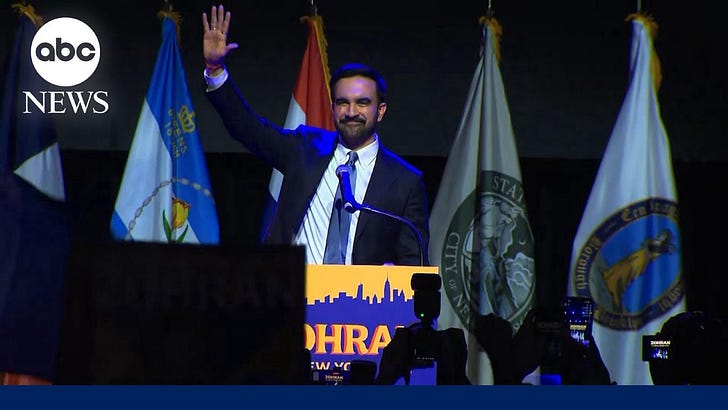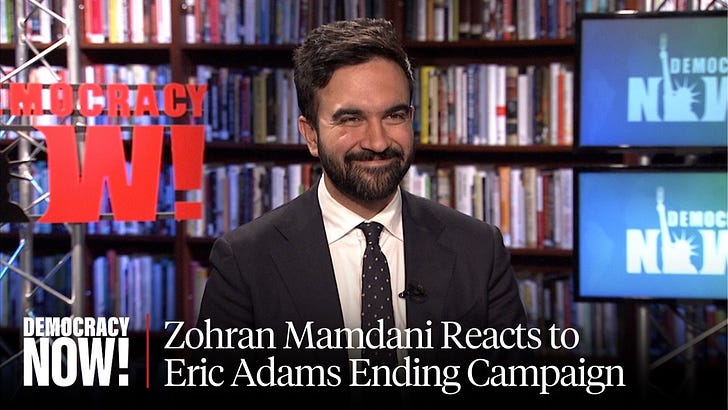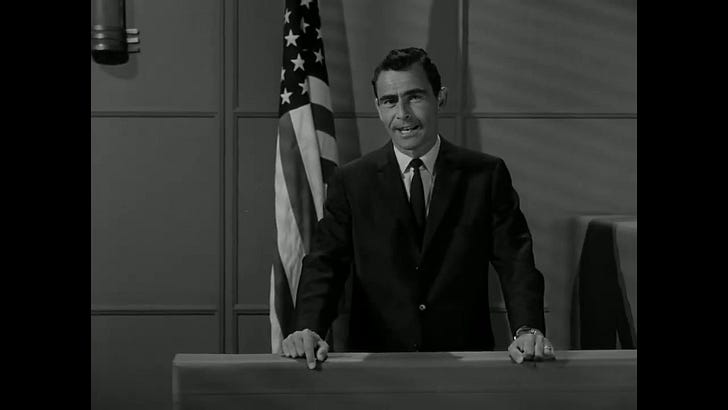Author and activist Maya Contreras joins me to discuss the aftermath of New York City Mayor-elect Zohran Mamdani’s victory, and what that means for a Democratic Party that might have a restrictive definition of “big tent.”
Maya lives and works in New York City. She’s just finished a new book, The Language of Theft: How The Wealthy Fund Narratives That Rob America of Our Common Sense, in which she offers a blueprint of strategies Democrats can use to counter destructive, donor-funded right-wing narratives.
You can watch or just listen to our discussion here at the newsletter, but I’d also appreciate it if you hopped over to my YouTube Channel to leave a like and subscribe.
Edited transcripts from our conversation:
MAYA: New York has a lot of representatives. I want to compare it to high school. There’s little cliques throughout New York City. And tere are a lot of them that are very excited about Zora Mamdani and backed him and were enthusiastic about him. And they are Democrats, right? There were some from, obviously, Democratic Socialists of America. But then there are some that are supportive of Israel who backed Mamdani, like Brad Lander, right?
So I don’t want people to think that it was this kind of myopic support for him in New York. It’s not. It was across the board.
Before I get to the negatives of who didn’t support him, I want to say why he won. I’ve seen a lot of people try to break all these things down. And to me, it’s not as complicated as people are making it sound.
I ran for office. It was a disaster. But what I learned from it was it’s difficult. It’s a very hard thing to do, to put yourself out there. If you watch [Mamdani’s] first video where he is thinking about running for mayor a year ago, he’s in the Bronx. No one wants to talk to him.
He’s just trying to kind of get a sense of why they voted for Trump. And what he saw that most of the people saw was that Trump was promising them, by the way, free shit.
You know how everyone’s like, “Mamdani is just promising all this free stuff.” Well, so was Trump, by the way. He was promising that he was going to lower inflation and that groceries are going to become cheap again and affordable again. And none of that has happened.
So Mamdani went out there into the communities and had conversations with people, long, hard conversations. And he was just kind of being himself. What he was saying was nothing that other Democrats in the past [hadn’t.] He wasn’t saying something new … He was talking about affordability. That has been a platform in the Democratic Party for a very long time. The difference is he really did distill and simplify the message.
That’s what’s tough for people like, I’ll say, Hillary Clinton and for Kamala Harris. Keep in mind, they are running at the federal level. It’s very different to run at the federal level than it is to run at this level, the local level.
I’m tired of this analysis of “Kamala didn’t do that and she didn’t do this.” Well, they’re also running at a different level. You’re having to go wider in your approach.
However, the way they were discussing policies was complicated when they were talking about the lift policy or talking about housing policy. Mamdani distilled it down to freeze the rent, which is, as New Yorkers, we know what that means. Free buses. We already know that 40% of New Yorkers don’t pay for the buses anyways. It’s tough here. We know that landlords keep pushing up our rent. So he was doing messaging that connected with locals who understood what that meant. And that’s why it landed.
One of the issues that’s the difference between Clinton and Kamala is that they were trying to make everyone happy. There’s that old adage, you try to make everyone happy, you make nobody happy. It was a little bit like that, where Mamdani [wasn’t/]
[The mayoral candidates] were all asked, “What’s your first trip going to be?”
All the Democratic candidates said, “We’re going to go to Israel.”
And Mamdani was one of the first candidates to ever say, “I live in New York. I’m a mayor for New York. I’m a mayor for everybody. My first trip will probably be going to Harlem to check on my constituency, going to Staten Island.”
Th at meant that he was staying centered in his own ethics, and I think that was refreshing for people to see.
SER: After Mamdani decisively won the primary, it shouldn’t been very easy for Democratic leaders like Hakeem Jeffries and Chuck Schumer to just say, “We respect that the people have spoken,” but this didn’t happen. What are your thoughts on that?
MAYA: it shows a lack of spine, and you have to understand, Jeffries and Schumer are deeply entrenched in old school, New York politics. Part of that is their support and military support for Israel, and they felt trapped. They felt like, if I do this, I am going to have to explain it to my donors. To me, that’s spineless.
I think it’s pretty easy to say, so he is the Democratic nominee. He has invigorated a base in New York City. And therefore, I want to support who the voters support. Would have been very easy to do that.
Also, I will tell you this. A lot of representatives that I’ve spoken to in the past, they’ve talked about the pain in the ass it is to fundraise. If you have donors giving you hundreds of thousands of dollars and that’s a couple more phone calls you don’t have to make, this is one of the reasons why they’re just like, I don’t want to take a stance on this.
Jeffries and Schumer are underestimating how much the party is wanting to take a new direction across the board. Because when you look at who voted for Mamdani, it was Black voters. It was Jewish voters. It was across the board. People that would have ordinarily run to someone like Cuomo had no interest. So Jeffries and Schumer are underestimating how much people are wanting to embrace more progressive ideas and people are tired of this idea of incrementalism, especially when they see Republicans literally ignoring the law.
I will also say that for a lot of people watching children getting killed every day in Gaza, [they’re thinking,] I cannot understand what our continuous involvement is in this anymore. For some people, they’ve always felt like that, and then other people, what we call “normie Dems,” were also starting to say the same thing. I think that Mamdani was somebody that wasn’t tainted by any of that.
So now regarding “big tent politics,” Mamdani would not work this way in Virginia at the governor level, right? Now I’m saying that it couldn’t happen in a few years, but right now, Virginia has a different type of economy, My husband’s from Virginia. It’s very military outposts. There’s a different way of discussing things.
What people should understand when they’re talking about politics is that all politics is local. So, that’s why Mamdani works in New York City, because he embraced immigrants. He embraced the diversity of ethnic identity. This is a city that has about 900,000 Jewish people in it, about 880,000 Muslim people here, 50 percent of New York is Christian. We have a diverse background of all these different ethnicities and religions. And he embraced all of that. He leaned into that.
Whereas when Obama was president, he couldn’t lean into that. When people were accusing him of being from Africa, he tried to move away from any of these types of associations. And Mamdani was, like, I don’t have to run away from that because New York is built off of immigrant labor.













